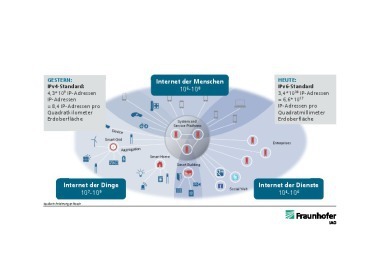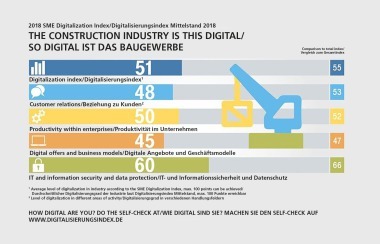Digitization in the construction sector
The digital transformation is well and truly affecting all sectors of industry by now, influencing all links in the value chain and changing entire business models. In the construction industry, 93 % of firms expect digitization to affect their corporate processes in their entirety. But few are taking corresponding action so far, as demonstrated by the findings of the new Roland Berger study, "Digitization in the construction industry – Building Europe's road to Construction 4.0". The Roland Berger experts canvassed the opinions of 40 construction companies and building materials firms from Germany, Austria and Switzerland, asking for their views on the potential of digitization and how far they have come with implementation.
The survey found that less than 6 % of construction firms use digital planning tools end to end. And 100 % of respondents do not believe they have fully exploited their digitization potential. "The slow pace of implementation is surprising given how productivity has developed in the construction industry in recent years," said Kai Stefan Schober, Partner at Roland Berger. Productivity in Germany has risen by a mere 4 % in the past decade. By way of comparison, the entire German economy has seen productivity growth of 11 % over the same period, with manufacturing growing by as much as 34 % and the whole of the secondary sector by 27 %.
No-one is yet putting digitization into practice with consistency
The Roland Berger study focused on four crucial levers for the digital transformation of companies in the industry: digital data usage, digital access for customers and suppliers, increased automation and extended connectivity. The relevance of the levers for companies varies depending on which segment of the construction industry they are operating in. "The more obvious the advantages, the more clearly companies perceive the potential offered by digital transformation," said Schober. Study participants can see major potential for improvements through the use of digital data in logistics or in sales & marketing, for instance.
"Companies need to learn to apply all of the levers of digitization at every link in the value chain to help them increase productivity to the max," said Philipp Hoff, the study's co-author. "Not much has happened on that front so far: None of the companies we polled have implemented digitization consistently across all areas."
Diverse range of digital applications available
A wide range of applications and software solutions are already on the market and can be used to help establish "Construction 4.0". In procurement, one of the major cost blocks in the construction business, digital platforms can enable firms to shave up to 10 % off their costs, for example. The story is comparable in building site logistics: Supply software allows deliveries to be made precisely when materials are needed on site. Such just-in-time deliveries reduce storage needs and costs and minimize rearrangement work for the construction workers, who currently spend 70 % of their time cleaning up the site and moving things around or looking for materials. Similarly, smart, connected construction machinery helps optimize capacity utilization.
Moreover, it is very important for construction industry players to know what their customers want and to take account of their needs. Mobile apps enable construction firms and building materials suppliers to share information with their principals practically in real-time – before, during and after a development project. "Professional customer relationship management is extremely important in the construction industry. Yet it is an activity whose significance has largely been underestimated so far," said Hoff, who explains: "On completion of a construction project there is often a complete lack of contact with the client for some considerable time. But construction firms should establish long-term customer relationships if they want to be in the mix when it comes to the next development project on the cards. Digital after-sales applications can help here."
Building information modeling compulsory for public projects
Building information modeling (BIM) is already tremendously important to the construction industry. The advantage is that it allows for digital simulation of the project prior to the build, thus minimizing planning errors and potential extra costs as well as identifying possible alternative solutions at an early stage. The use of BIM is already compulsory on all public infrastructure projects in some European countries and will be so in Germany by 2020.
"For one thing, this is going to change who gets to make decisions on construction projects", said Roland Berger expert Schober, outlining his view of the future setup: "In the future it will be planners or architects, not construction companies, who decide on material qualities and choose suppliers." The volume of product data will rocket at the same time – thanks to digital documentation. Construction firms do need to be able to deal with this flood of data, but on the other hand the smart use of data presents the opportunity to develop new business models and services. Schober is therefore in no doubt: "There is no alternative to digitization. Construction is no exception. The industry has a lot of catching up to do and must not drag its feet."
Roland Berger GmbH
www.rolandberger.com





